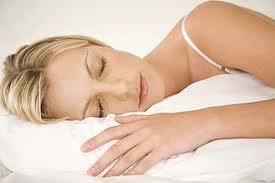
Lack of sleep can cause a person to gain weight
in several ways, according to researchers at the New York Obesity Nutrition Research Center at
St. Luke's-Roosevelt Hospital.
Although the sleep-deprived burn about the same amount of calories, they consume about 300 more per day. Since it only takes about 3,500 calories to add one pound to your body, a few hundred calories a day can quickly turn into extra weight.
According to sleep disorder specialists, when a person gets too little sleep, his or her metabolism slows down to save energy. That slowdown triggers the release of the hormone cortisol, which in turn increases appetite. The body senses that it needs more energy, so it asks for more food.
Lack of sleep also causes the body to release more ghrelin, a hormone that signals hunger, and less leptin, the hormone that tells your stomach that
it's full. This causes the body to crave more food
but lacks the sensitivity to know when to quit eating. And, of course, being awake more hours gives you more time to eat.
Sleep disorder experts say "The later you're up at night, the greater the likelihood that you're going to eat," And "you're more likely to eat high-fat, high-carb foods."
Furthermore, the body burns the most calories during REM sleep, a deeply restful phase, and a
lack of sleep means less time in REM.
For best results, experts suggest getting 7.5 hours of sleep a night. If you have trouble sleeping, they advise that you stick to a nightly routine, exercise during the day, write your worries in a journal,
and keep pre-bedtime activities relaxing.
The research is published in the American Journal of Clinical Nutrition.
Source: New York Obesity Nutrition Research Center
This article is for informational and educational purposes only; It is not intended to provide medical advice, diagnosis or treatment. Consult your doctor orhealthcare professional.
